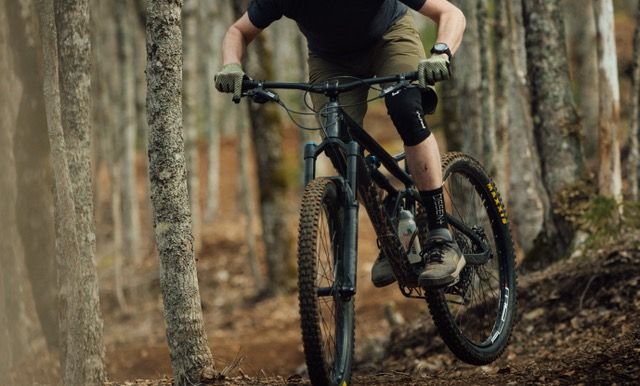When You Hurt from Holding on too Tightly
Oct 9
/
Terri Conlin

Listen to the audio version here:
Recently, I began a new morning routine. After a strong cup of coffee and Ignatian prayers, rather than a slow walk, I rode my bike into the woods, crunching pinecones and brushing juniper branches, releasing their cedar-like smell into the chilly air. I felt a thrill, cycling to my favorite meadow and back, winded and wild, all before breakfast.
But fairly quickly, I noticed tenderness in my hands.
They hurt in a particular place, right at the top of my palm underneath my fist knuckles. At first, I thought it was my hands that needed toughening.
But soon, I noticed my entire posture was rigid, especially on twisted terrain and downhill trails.
My mind flashed back to sixteen when I squeezed my handbrakes so hard I flew over the handlebars, landing hard on rocky ground, knocking the wind clean out of me as I stared up at the sky. Decades later, my body still remembers that fall.
With that fear coursing through my veins, I was white-knuckling the handlebars and bearing down in the seat. No wonder I needed padding in those places!
Meanwhile, in my spiritual and emotional life, I had been yearning for childlike trust paired with mature intimacy. I had been exploring in prayer and with my spiritual director what it felt like to let my guard down and open my heart toward God and others, even when I was afraid of being hurt. Rather than guardedness or pretending I had no fear, I wanted what David Benner describes as,
“The invitation to loving encounter with God (that) immediately challenges this posture; God invites us to come in faith that expresses itself in vulnerability and brutal self-honesty." ¹
Our tendencies to protect ourselves are natural and often found in our lived experiences. We may have fallen, been in an accident, or sustained an injury. Live long enough, and we all know hurt, betrayal, or abandonment in one way or another. All of these experiences naturally put us on guard.
And, some guardedness in some circumstances is wise.
Still, when we realize we want something different, deeper, more open like a flower, when we sense an invitation to a more tender way of being by a Good Shepherd whose warm smile is always turned towards us, what if we open our hands and ourselves to his mercy and generous love?
It felt counterintuitive at first to loosen my hold. But I started intentionally relaxing my hands on my handlebars and coming out of the saddle on rugged terrain. As reluctant as I was to relax when my nervous system screamed, “Hold tight!”, having a more nimble hold brought a kind of beautiful embrace between me and the terrain. Now, my body was moving with the bike, opening toward the trail rather than protecting myself against it in fear.
It is true that I might still be thrown by the next rock, root, or rut. A helmet and gloves were necessary, but I was practicing a kind of trust in this small way that I could use throughout my life.
Thomas Merton writes,
“There is a difference between being strict and being rigid. The well-disciplined soul, like a well-disciplined body, is agile, supple and adaptable. A soul that is not pliable and free is incapable of progress in the ways of prayer.” ²
There was another side to this posture of holding on too tightly. My posture seemed to say I have to do the holding or else all will fall apart. It reminds me of something my kids and now grandkids have all said as toddlers, “I hold you, Jojo,” which, of course, means, “Hold me, please!” and I happily scoop them up into my arms.
I often need the reminder of who is actually doing the holding,
“[Jesus] was there before any of [creation] came into existence and holds it all together right up to this moment.” Colossians 1:17 Msg
The Greek word for holding together is synistemi, which includes deeper concepts of holding, such as consisting and forming. The holding Christ is actively doing is not white-knuckling as if he could let go, but a creative sustaining power trustworthy enough to hold us and the cosmos together despite us being thrown by any circumstance or our own resistance. He is always already holding us in love.
Even when the road is bumpy, we are safe in Jesus’ arms.
Ways to practice opening toward God:
• Notice your posture when stressed or afraid.
• Locate where you are tender or tight.
• Name the fear, big or small, making you closed, rigid, or guarded.
• Practice gently opening your body wherever you are holding a rigid stance: hands, chest, neck, shoulders, jaw. Take a deep breath and relax into Jesus’ everlasting arms. They are already open for you.
• Repeat Padre Pio’s surrender prayer,
O Jesus, I surrender myself to You, take care of everything!
¹ (Benner, 2010, p. 32)
² (Merton, 1960, p. 77)
Empty space, drag to resize

Terri Conlin
Terri Conlin is a certified Spiritual Director, writer, and occasional preacher. She has a BA in Architecture from the University of Texas at Austin and a MA in Spiritual Formation from Portland Seminary. She thrives when creativity and resilience flourish together in God’s sheltering places. Terri and her husband live among the rainy firs of Oregon. They have four grown children and seven feisty grandchildren she calls the Wonders. Most days you can find her outside walking or writing about spiritual formation while sipping dark roast coffee in a thrifted mug.
https://www.terriconlin.com/
https://www.terriconlin.com/

